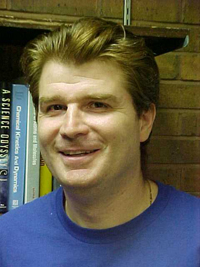Dr. Costas Efthimiou
The Daily Galaxy article Hollywood Science: Special Effects – The Best & Worst said
“Costas Efthimiou, a physics professor at the University of Central Florida has had it with all the ridiculous physics blunders running rampant in cinema.Remember the scene in Spiderman where the Green Goblin is standing atop a bridge holding M.J. in one hand and a rail car filled with passengers in the other?
Efthimiou realizes it’s ‘just a movie’ but it still really irritates him that the Green Goblin holds the two objects as if M.J. and the train are the same weight (an inference I’m sure Kirsten Dunst doesn’t appreciate).
‘You are going to move toward the force that is stronger,’ he said. ‘In the movie, it shows the Green Goblin standing still. That’s not possible.’
Personal annoyances aside, Efthimiou contends that there is a more serious reason for Hollywood to stop making movies with wildly distorted science concepts. He contends that these inaccuracies are making viewers dumber.”
Costas Efthimiou, Ph.D. is Professor at the Physics Department of the University of Central Florida where he covers everything from physics in films to advanced quantum field theory.
He authored Quantum group symmetry for the Φ12-perturbed and Φ21-perturbed minimal models of conformal field theory, and coauthored Separation of variables and exactly soluble time-dependent potentials in quantum mechanics, Particle-Field Duality and Form Factors from Vertex Operators, Minimal Models of CFT on Z_N-Surfaces, Is the Classical Bukhvostov-Lipatov Model Integrable? A Painlevé Analysis, and the innovative Amazon download Cinema fiction vs. physics reality: ghosts, vampires, and zombies: two physicists examine certain features of popular myths regarding ghosts, vampires.
Costas earned his BSc from the University of Athens and his PhD from Cornell University. After this, he spent an additional year at Cornell as a Lecturer teaching physics courses. He then accepted a research associate position at Tel Aviv University where he stayed for two years. He returned to US as a Visiting Scientist at the Math Department of Harvard University. He continued with a Visiting Scientist appointment at Cornell and Columbia Universities. In August 2000, he joined the Physics Department of UCF.
